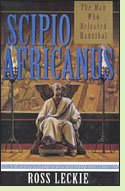Scipio Africanus
by Ross Leckie
Reviewed by David Maclaine

The artistry of Ross Leckie in Scipio Africanus is of a different kind than that of the other writers who have written about the war with Carthage. Leckie's characterization is rock-solid, but what gives his novel literary heft is the feeling that he has an underlying theme of importance and applies his great skill in literary construction to bring it out. The focus veers between the “present” when Scipio is dictating his memoir at a moment when the malice of Cato the Elder threatens to undo one of the greatest Romans of all time, and his memories of emerging from childhood and into young manhood. It is the story of how Scipio became the man who not only won the war against Carthage and defeated Hannibal on the battlefield, but also won two key victories when Rome's attention turned to Macedon. It is a measure of Leckie's skill that my great regret at the end of the novel was that the account of his life extends no farther than his victory at Zama and the conclusion of the Second Punic War. I wanted to learn more about the mature Scipio.
Scipio Africanus is largely a coming-of-age novel in memoir form. The parallel story of the scribe Bostar, a man with past connections to Hannibal and his own secrets about that general's legacy, offers respite from the main narrator's viewpoint and a useful outside perspective. But Scipio's own narrative is in large part a thoughtful treatise on education, of interest to anyone who cares about that subject. It treats the process of learning, both of skills and wisdom, with astuteness, providing relevance beyond its impact on a figure from history. In Scipio, the talent to shape history on the battlefield combined with as much human goodness as a general's role allows. The counterpoint in this novel between Scipio's virtues and Cato's vice is more telling than most of the comparisons in Plutarch's Lives. (1998, 240 pages)
More about Scipio Africanus at Powell's Books, Amazon.comScipio Africanus appears on the list of The 50 Best Historical Novels for a Survey of Ancient Roman History
Other novels about the Second Punic War:
Hannibal by Ross Leckie (1996), about the great Carthaginian general and his challenge to Rome. See review or more info at Powell's Books
Pride of Carthage by David Anthony Durham (2005), about Hannibal and Carthage during the Second Punic War. See review or more info at Powell's Books
The Coin of Carthage by Bryher (1963), about ordinary people struggling to survive amid the Second Punic War. See review or more info at Amazon.com
Nonfiction about Scipio Africanus:
Scipio Africanus: Rome's Greatest General by Richard A. Gabriel (2008). More info
Scipio Africanus: Soldier and Politician by H.H. Scullard (1970). More info
Scipio Africanus: Greater than Napoleon by B.H. Liddell Hart (1926). More info
Online:
Scipio Africanus at Wikipedia
Back to Novels of Ancient History
Back to Directory of Book Reviews